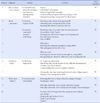Abstract
Purpose
The aim of this study was to investigate the effects of a peer helper training program on existential spiritual
well-being, peer relationship, and depression for students attending a specialized girls vocational high school.
Methods
The participants were forty-two students attending a specialized girls vocational high school in D city. Data were collected form october 23 to December 24, 2013. To test the effects of the peer helper training program, the participants were divided into two mached groups, an experimental group (21) and a control group (21). Data were analyzed using χ2-test, Fisher exact probability test, and t-test with the SPSS/WIN 12.0 program.
Results
After attending the peer helper training program, significant differences between the experimental group and the control group were found for existential spiritual well-being (t=3.35, p=.002) and peer relationship (t=2.29, p=.028). However, there was no significant differences in depression between the two groups.
Conclusion
The results indicate that the peer helper training program enhances existential spiritual well-being and peer relationship for students attending a specialized girls vocational high school. Therefore, this program is a good strategy that teachers and community mental health nurses can use to increase existential spiritual well-being and peer relationship of these high school girls.
Figures and Tables
References
1. Lee MH. The effects of adolescents' perfectionism, parent and peer attachment on depression. Stud Korean Youth. 2014; 25(4):87–112. DOI: 10.14816/sky.2014.11.75.87.

2. Korean Statistical Information Service [KOSIS]. Survey of children and youth rights: degree of depression-sad or depressed, 2013 [Internet]. Seoul: Korean Statistical Information;2014. Apr. cited 2015 Oct 1. Available from: http://kosis.kr/statHtml/statHtml.do?orgId=402&tblId=DT_ES40201N_020&conn_path=I2.
3. So AY, Sohn SY, June KG, Yi GD. The influence of depression, temperament, characteristic on alcohol drinking in vocational high school students in Gangwon-do. J Korean Soc Sch Health. 2010; 23(2):181–191.
4. Jeong SY, Lee HJ. An analysis of career preparation behaviors of specialized high-school students based on typology of career decision Status. J Bus Educ. 2014; 28(4):1–29.
5. Lee HG. Sex differences in the effects of adjustment problems on internalizing/externalizing problems of juvenile delinquents. J Adolesc Welf. 2013; 15(3):295–319.
6. Lee JS, Lee HS. Relationships of individual and family variables with adolescents' depression. J Korean Home Econ Educ Assoc. 2012; 24(4):77–89.
7. Kim HS. The longitudinal mediation effects of self-esteem in the influence of academic stress to adolescents' depression. Korean J Youth Stud. 2014; 21(3):409–437.
8. Shin SM, Kim JE, Oh JH, KOO CS. The relationship between existential spiritual well-being and internet addiction in adolescents: mediating effects of self-esteem and depression. Korean J Couns. 2011; 12(5):1613–1628.
9. Sohn BD. Adolescent's depression and delinquent aggressive behavior the effects of domestic violence and perceiving meaning of life. J Korean Counc Child Rights. 2008; 12(4):449–471.
10. Kang KA, Kim SJ, Song MK, Kim MJ. Effects of logotherapy on life respect, meaning of life, and depression of older schoolage children. J Korean Acad Nurs. 2013; 43(1):91–101. DOI: 10.4040/jkan.2013.43.1.91.

11. Jung HO, Kim HS. Effects of a positive peer relationship training program on self-esteem, bullying, and depression for children in early adolescence. Child Health Nurs Res. 2014; 20(3):133–141. DOI: 10.4094/chnr.2014.20.3.133.

12. Learner RM, Roeser RW, Phelps E, editors. Positive youth development and spirituality: from theory to research. West Conshohocken, PA: Templeton Foundation Press;2008.
13. Park JA, Yoo SK. Relationship of resilience, spiritual well-being and parental attachment. Korean J Psychol Gen. 2003; 15(4):765–778.
14. Richards MH, Crowe PA, Larson R, Swarr A. Developmental patterns and gender differences in the experience of peer companionship in adolescence. Child Dev. 1998; 69(1):154–163. DOI: 10.2307/1132077.

15. Kang YS. A study on the influence empathy, emotional expressiveness on adolescent's quality of peer relationship. J Psychother. 2013; 13(1):153–176.
16. Lim JW. Yoon MS. Middle-school students' friendship by perceived attachment styles. J Sch Psychol Learn Cons. 2010; 2(1):73–85.
17. Lim WO. The influence of friends on delinquent behavior among female students attending specialized high school [master's thesis]. [Incheon]: Inha University;2013. 79.
18. Kang JY, Lim ST. The effects of peer counseling on high school students' communication skills. J Eval Couns. 2010; 3(1):1–14.
19. Shin EJ, Kim HS. Effects of a peer gatekeeper training program on self-esteem, interpersonal relationships with friends, and suicide probability for high school students. J Korean Acad Psychiatr Ment Health Nurs. 2013; 22(3):241–251. DOI: 10.12934/jkpmhn.2013.22.3.241.

20. Paloutzian RF, Ellison CW. Loneliness spiritual well-being and the quality of life. In : Peplau LA, Perlman D, editors. Loneliness: a sourcebook of current theory, research and therapy. New York: John Wiley & Sons;1983. p. 224–236.
21. Schlein S, Guerney B, Stover L. The interpersonal relationship scale [dissertation]. [Pennsylvania]: Pennsylvania State University;1971.
22. Cheon SK. A study on the effectiveness of social skills training program for rehabilitation of the schizophrenic patients [dissertation]. [Seoul]: Soongil University;1995. 178.
23. Radloff LS. The CES-D Scale: a self-Report depression scale for research in the general population. Appl Psychol Meas. 1977; 1(3):385–401.
24. Cho MJ, Kim KH. Diagnostic validity of the CES-D (Korean Version) in the assessment of DSM-III-R major depression. J Korean Neuropsychiatr Assoc. 1993; 32(3):381–399.
25. Kim HS, Park WJ, Kim MH, Park GR. Developmental report of the student suicide crisis manual for teacher. Seoul: Ministry of Education;2011. February. 15. Report No. 1942-20110224.
26. Kim HS, Park GR, Jung HO. Effects of a peer gatekeeper training program on existential spiritual well-being, interpersonal relationship with friends, and suicide probability for middle school students. J Korean Acad Soc Nurs Educ. 2014; 20(3):372–381. DOI: 10.5977/jkasne.2014.20.3.372.

27. Lee BW, Ahn JY, Lee CJ, Lee SH. A comparative study on awareness of middle school students, school parents, and human resources directors in industrial institutions about admission into specialized high schools and career after graduating from specialized high schools. J Korean Inst Ind Educ. 2013; 38(2):48–67.
28. Lee MJ, Lim CK, Ryu JY. The effect of the stress, anxiety and depression on somatization: focused on specialized vocational high school students. J Welf Adm. 2014; 30(1):109–133.




 PDF
PDF ePub
ePub Citation
Citation Print
Print






 XML Download
XML Download